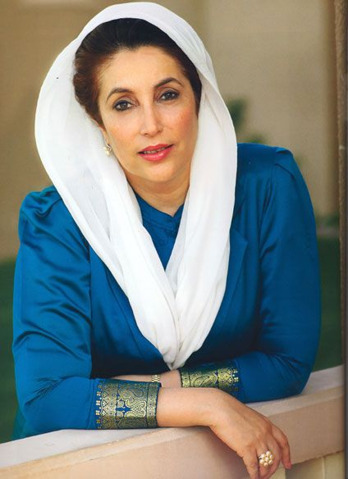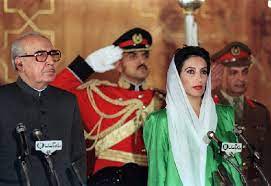Shaheed Benazir Bhutto, the Very Heart of Pakistani Politics

Benazir Bhutto was not just a prominent political figure in Pakistan; she was a trailblazer in the realm of women’s participation in politics and her life was a stirring tale of both triumph and tragedy. Her enduring legacy continues to influence the very heart of Pakistani politics to this very day
Early Life and Education:
In her early life, she was born on June 21, 1953, in the vibrant city of Karachi, Pakistan, into a family that held a deep, enduring connection to the country’s political landscape. As the daughter of former Prime Minister Zulfikar Ali Bhutto and Begum Nusrat Bhutto, she was immersed in the complex world of politics from a young age. Her early education began in the classrooms of Pakistan, but it was her pursuit of higher education abroad that set her on the path to becoming a political luminary. She graced the halls of Radcliffe College at Harvard University and, later, the venerable Oxford University, where she earned a degree in Philosophy, Politics, and Economics. These academic endeavors formed the bedrock of her understanding of political science and governance.

Shaheed Benazir’s Commitment to Democracy and Determination through Party:
The remarkable ascent of Benazir Bhutto in the world of politics was a journey that ignited a spark of hope. Her political odyssey began in earnest in 1977 when she returned to Pakistan after her father’s tragic overthrow in a military coup led by General Muhammad Zia-ul-Huq. She embraced her destiny and became actively involved in her family’s political party, the Pakistan People’s Party (PPP), a party her father had founded. Her magnetic charisma, unwavering commitment to democracy, and boundless determination quickly made her a shining star within the party.
Political Journey, Challenges, and Exile:
In 1988, the world watched in awe as Benazir Bhutto scripted history. With her election as Prime Minister of Pakistan, she shattered not only the glass ceiling but also age-old gender norms. She became the first woman to lead a Muslim-majority country, a profound milestone that resonated with women across the nation, and far beyond.
But her journey was not without its challenges. Her first term as Prime Minister was marked by economic difficulties and political turbulence, facing formidable opposition from various quarters, including the powerful military establishment. In 1990, her government was dismissed amid allegations of corruption. Yet, true to her unwavering spirit, she returned to power in 1993, securing a second term as Prime Minister.
Benazir Bhutto, Beacon of Hope For Women’s Rights and Welfare Programs:
During her tenure, Benazir Bhutto was not just a political leader; she was a beacon of hope. She championed democracy, women’s rights, and social welfare programs, striving to make Pakistan a more equitable and prosperous nation. Her determination knew no bounds as she expanded the role of women in Pakistani politics and introduced transformative policies to improve education and healthcare. However, it is essential to acknowledge that she was not immune to criticism and controversy, as allegations of corruption continued to swirl around her throughout her political career.
Return to Pakistan and Assassination:
The tragedy that befell Benazir Bhutto was both shocking and heart-wrenching. On December 27, 2007, while fervently campaigning for the upcoming general elections, she was assassinated in Rawalpindi, Pakistan. Her untimely death left an indelible void in Pakistan’s political landscape and cast a long shadow over the ongoing struggle for democracy.
Legacy and Impact:
But her legacy endures, not as a mere memory, but as a powerful symbol of women’s empowerment and her unwavering commitment to democracy in Pakistan. Her life story continues to inspire women and activists across the globe, demonstrating that even in the face of adversity, one can rise to extraordinary heights. The torch she carried is now passed to the next generation. Her daughter, Bakhtawar Bhutto Zardari, and her son, Bilawal Bhutto Zardari, have taken up her mantle, carrying forward her political legacy and the aspirations of the nation.
Conclusion:
In conclusion, Benazir Bhutto’s life was a testament to her unwavering dedication to advancing democracy, women’s rights, and social welfare in Pakistan. Her journey to the highest office in the land was not just a milestone; it was a revolution for women in politics. Her legacy continues to shape the political discourse in Pakistan and beyond, proving that the indomitable spirit of one woman can ignite change that reverberates through generations.
FAQ’s:
i) Who was Benazir Bhutto, and why is she important in history?
ii) What were the key political challenges faced by Benazir Bhutto during her time in office?
iii) How did Benazir Bhutto impact women’s rights and empowerment in Pakistan?
iv) What was Benazir Bhutto’s role in Pakistan’s foreign relations?
5 comments